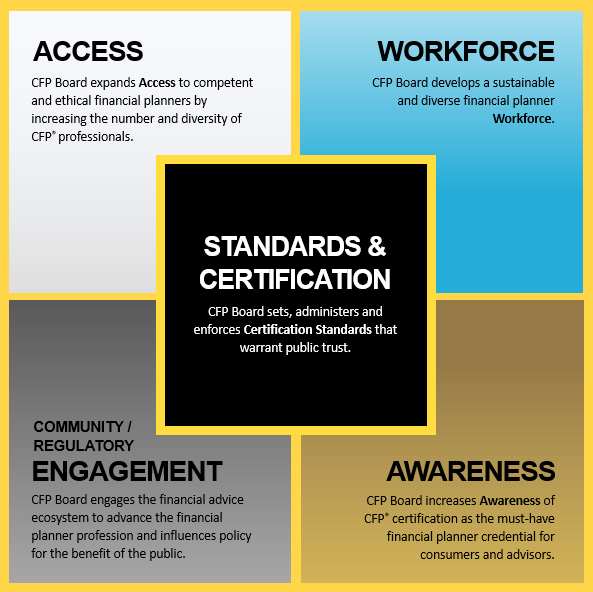Mission & Priorities
CFP Board consists of two affiliated nonprofit organizations, both focused on achieving our Strategic Priorities.
The mission of CFP Board of Standards, a 501(c)(6) nonprofit organization, is to credential competent and ethical financial planners, uphold CFP® certification as the recognized standard and advance the financial planning profession.
The mission of CFP Board Center for Financial Planning, a 501(c)(3) nonprofit organization, is to advance competent and ethical financial planning and expand CFP® professional diversity for the benefit of the public.
Our Strategic Priorities
To give focus to CFP Board’s work to further its mission, CFP Board’s Board of Directors and executive leadership team develop multi-year strategic plans for the organization’s operations, built around a framework of strategic priorities. The collaborative development of the plan aligns CFP Board’s governance and policies with the operations of CFP Board.
2022–2026 Strategic Priorities
- Standards & Certification: CFP Board sets, administers and enforces certification standards that warrant public trust.
- Access: CFP Board expands access to competent and ethical financial planners by increasing the number and diversity of CFP® professionals.
- Awareness: CFP Board increases awareness of CFP® certification as the must-have financial planner credential for consumers and advisors.
- Community & Regulatory Engagement: CFP Board engages the financial advice ecosystem to advance the financial planner profession and influences policy for the benefit of the public.
- Workforce: CFP Board develops a sustainable and diverse financial planner workforce.

More about the 2022-2026 Strategic Priorities
2017–2021 Strategic Priorities
- Growing Awareness of CFP® certification as the recognized standard for competent and ethical financial planners and of financial planning as an attractive career choice;
- Expanding Access to competent and ethical financial planning by increasing the number and diversity of CFP® professionals, and delivery of pro bono financial advice to underserved communities;
- Assuring Accountability by holding CFP® professionals to rigorous standards, recognition of financial planning as a profession, and effective oversight of financial planners and;
- Serving as the respected Authority for the profession by setting standards, certifying financial planners, and by advancing the Center for Financial Planning.

